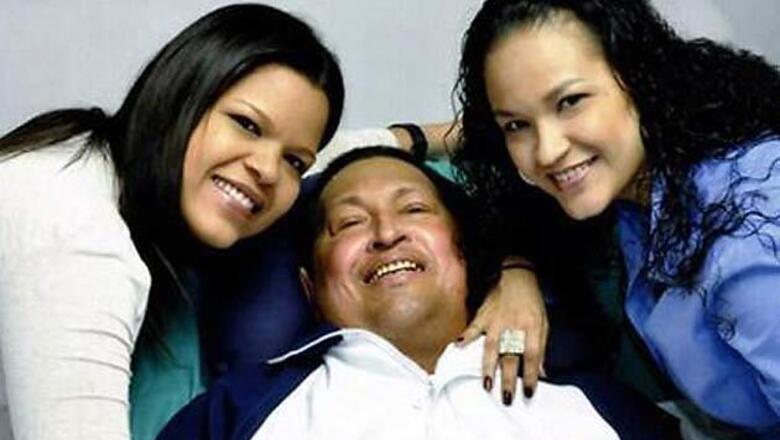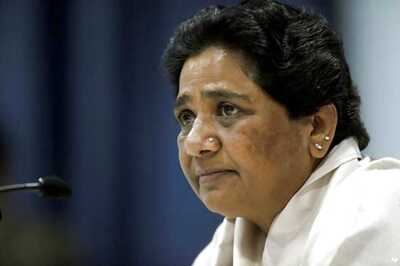
views
Caracas: Venezuelan President Hugo Chavez made a surprise return from Cuba on Monday, more than two months after surgery for cancer that has jeopardized his 14-year rule of the South American OPEC nation. The middle-of-the-night homecoming implies some medical improvement - at least enough to handle a flight of several hours - and will again fire up supporters with hope that the socialist leader could return to active rule.
Yet there was no new information on Chavez's health nor images of his arrival, and aides say the 58-year-old's condition remains "complex."
Chavez could be returning to govern behind the scenes, or may be hoping to ease political tensions in Venezuela and smooth a transition to Vice President Nicolas Maduro. Chavez has urged voters to back Maduro should he have to stand down and a new presidential election be held.
"We have returned to the Venezuelan fatherland. Thank you, my God! Thank you, my beloved people! We will continue the treatment here," Chavez said on Twitter after flying in.
Maduro said Chavez arrived at about 2:30 am (0700 GMT) from Havana and was taken to a military hospital in Caracas. Until photos were published of him on Friday, the president had not been seen by the public since a six-hour operation in Cuba on December 11.
"I remain attached to Christ and trusting in my nurses and doctors," Chavez also tweeted. "Onwards to victory forever! We will live and we will conquer!" The messages were his first direct communication with the outside world since he went to Cuba in December.
His return thrilled supporters in the country of 29 million people, where his common touch and heavy spending on welfare policies have made him an idol to many of the poor. "It's fabulous news, the best thing possible," Chavez's cousin, Guillermo Frias, told Reuters from the president's rural birthplace in Barinas state. "Venezuela was waiting for him, everyone wants to see him. Welcome home! Thank God he's back!"
Fireworks were launched in some Caracas neighborhoods as loyal "Chavistas" celebrated. Top government officials were jubilant, with the information minister singing "He's back, he's back!" live on state TV. Chavez's latest surgery was his fourth in just 18 months since the disease was detected in mid-2011. He also has undergone weeks of chemotherapy and radiation treatment, and the government has emphasised that his condition remains delicate.
"It's a complex, difficult situation, but Chavez is fighting for his life," Foreign Minister Elias Jaua said at the weekend.
A euphoric crowd gathered outside the hospital where Chavez was taken, chanting slogans and dancing. Officials urged them to respect the peace of patients at the facility, where a huge banner of Chavez's face gazes out over a hillside shanty town. Congressional leader Diosdado Cabello said the president was comfortable at the hospital. "We're fixing all the details there so he lacks absolutely nothing," he said.
In the first images since his latest surgery, officials published photos on Friday showing a smiling Chavez lying in a hospital bed, reading a newspaper and flanked by his daughters. The government said he was breathing through a tracheal tube and struggling to speak.
One woman, who told state TV she was a nurse, said he had arrived walking and without a wheelchair or visible tubes. After winning re-election in October - and wrongly declaring himself cured - Chavez was too ill to attend his inauguration ceremony in January. Enraging his foes, the Supreme Court ruled that he remained president and could be sworn in later.
That could take place soon at the military hospital. "Now the president is back, there can be no doubt about the democratic institutions working in Venezuela," said Information Minister Ernesto Villegas.
"There were some who dreamed of unseating Chavez and the revolution, but here we always said Chavez is the president elected and re-elected by the will of the Venezuelan people."
Chavez's condition means there is a little chance he could quickly return to his old routine of thundering oratory, hours-long talk shows and casual chats in the street with supporters.
"Should he not be able to execute the duties of office, the Venezuelan Constitution requires an election to select a new president," said US State Department spokesman William Ostick.
Chavez's pre-dawn return was a typical surprise move for the former soldier whose rule has combined constant political theatrics with radical anti-US speeches, tough treatment of opponents and lavish spending of oil revenue on the poor. Critics have decried the secrecy over his health, and some want a formal declaration that he is no longer fit to rule. That would trigger a new election within 30 days, probably pitting Maduro against opposition leader Henrique Capriles.
Chavez's lengthy stay in Cuba had fuelled a long-held opposition accusation that Venezuela's government was being manipulated and directed from Havana. Former Cuban leader Fidel Castro is a political mentor and father figure to Chavez, and the older man visited him regularly in the hospital.
"I'm pleased you have been able to return to the piece of ... soil you love so much and the fraternal people who give you so much support," he wrote to Chavez in a letter published by Cuba's government on Monday.
"You have learned a lot about life, Hugo, in those tough days of suffering and sacrifice," Castro said, urging continued discretion over the president's condition to thwart "fascists" intent on toppling him.
A senior diplomatic source in the region said Cuban officials would be breathing more easily after Chavez's departure, partly because the political costs to Cuba were starting to mount as many wondered who was running Venezuela.
Maduro also was being hurt ahead of any new election, the source said, as Capriles increasingly accused the vice president and other officials of lying about their boss's condition. Maduro, 50, a former bus driver, is Chavez's heir apparent and would be favorite to win a close vote if he stepped down.
Chavez's return eclipses debate over a recent devaluation of the local bolivar currency. It has been highly unpopular with Venezuelans and opposition politicians have sought to present it as evidence of economic incompetence by the government. Capriles welcomed Chavez back but pointedly said he hoped it would mean a return to order in the government and attention to the daily problems of Venezuelans.




















Comments
0 comment